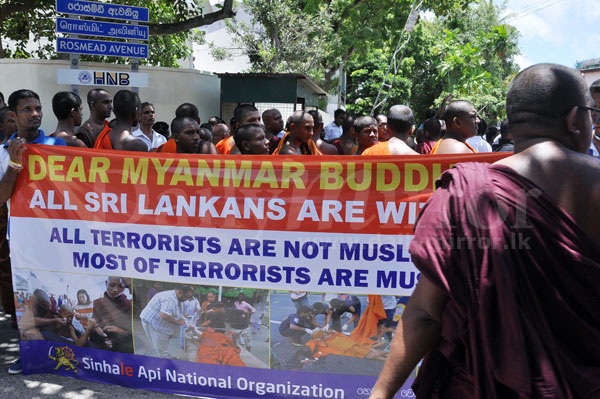Rohingyas in Sri Lanka in "Protective Custody" following Attack by Buddhist Monks
P.K. BALACHANDRAN

COLOMBO: Thirty one Rohingya Muslim refugees living in Mount Lavinia in the outskirts of Colombo under the aegis of the UNHCR, were taken into “protective custody” on Tuesday, after a group of extremist Sri Lankan Buddhist monks attacked them demanding their arrest and deportation.
“These are Rohingya terrorists who killed Buddhist monks in Myanmar,” one of the monks said in his live commentary on Facebook.
The refugees, including women and children, were sent away to a detention camp at Boosa in South Sri Lanka, because the Migrants’’ Detention Center at Mirihana near Colombo, was full, the UNHCR was told.
A police official said the refugees were taken into "protective custody" and had been brought back to their safe house when the mob staged a second attack, pelting stones and smashing their way into Rohingya houses.
"We have pushed back the mob and the refugees will be relocated in a safer place," the AFP quoted the unnamed police official as saying.
A monk, who stormed the walled multi-storey compound, was filmed by his radical Buddhist organization “Sinhale Jathika Balamuluwa” or Sinhalese National Force. He was urging others to join him in smashing the premises.
The UNHCR, the cooperation of which was sought by the police, was assured that the sojourn of the refugees in Boosa, primarily meant for Tamil terrorist suspects, would only be temporary. The UNHCR accepted the arrangement.
The government and the UNHCR are working together to ensure the refugees’ “safety” and that the Detention Center is in “good condition,” UNHCR told Colombo’s diplomatic community.
The UNHCR has called for a meeting with stakeholders in the government. The meeting could take place either on Wednesday or Thursday. It also said that the diplomatic community in Colombo will be briefed.
(Sri Lankan Navy Takes Rohingya Boat People into custody)
The presence of Rohingya Muslims in Sri Lanka was raised in Parliament on Tuesday.
Opposition MP Jayantha Samaraweera wanted to know what action the government would take in regard to extradition.
Wimal Weerawansa MP said the matter has become a serious issue as some of these people who were in the camp had got out of it and living in private residences.
“Some of the children of these people have been admitted to schools,” he said
In May this year, 32 Rohingyas, including women and children, were rescued off Kankesanthurai in the northern district of Jaffna by the Sri Lankan Navy and detained. They had been transported by two Indian nationals.
The refugees were living in Mount Lavinia about 10 km south of Colombo with the assistance of the UNHCR.
This month, Muslim MPs and organizations asked the government to accept Rohingyas fleeing from a fresh round of violence in Rakhine State in North Western Myanmar.
But Prime Minister Ranil Wickremesinghe categorically stated that government has no intention whatsoever of allowing them in as they would be “illegal” immigrants.
He said that no foreigner can be allowed to enter Sri Lanka except with a valid visa. And since the Rohingyas are moving in groups, there are obviously racketeers involved in the movement. The government cannot encourage that, the Prime Minister said.
One of the first steps that the Sri Lankan government took when the present troubles in Myanmar started on August 25, was to deny visas to Myanmar citizens.
On September 18, a group of seven monks from Myanmar were refused visas at the Colombo airport. The Sri Lankan embassy in Yangon has been instructed to issue visas only to Myanmar’s officials. Others would have to go through a thorough screening.
Tuesday’s attack by Buddhist monks did not take observers by surprise as there were demonstrations against the Rohingya Muslims in the recent past after it was suspected that government might accommodate them on humanitarian grounds giving them refugee status.
Buddhist radical organizations have expressed opposition to allowing the Rohingyas in, on the grounds that they are foreign Muslims and “radicalized” at that.
“ Having had a conflict with the Buddhists in Myanmar, they will have hatred in their hearts for Buddhists in Sri Lanka. This will create a communal conflict here,” said Opposition Member of Parliament, Udaya Prabhath Gammanpila of the Pivithuru Hela Urumaya.
A report in The Hindu on the Rohingyas living in the outskirts of Chennai shows how compassionately they are treated by the surrounding Tamil community and the Tamil Nadu government.
T.Ramakrishnan, who wrote the story, said that the refugees live in private houses and enjoy all the benefits which others get from the Tamil Nadu government. Their children are admitted to local schools and speak Tamil, the language of instruction in government schools. They also have Indian identity and fair price food cards.
They have been living there for the past five years.
Though not homesick and unhappy in Tamil Nadu, they would like to go back to their villages in Rakhine State in Myanmar, the paper said.
Tamil Nadu has a history of hosting refugees. More than 100,000 Sri Lankan Tamils poured into the state following the anti-Tamil riots in Sri Lanka in 1983 and many thousands are still living there in government-run camps.
Tamil Nadu has a sizeable number of Tibetan refugees also.
(Cover Photo: Sri Lankan Buddhists Protest Against Rohingya)



